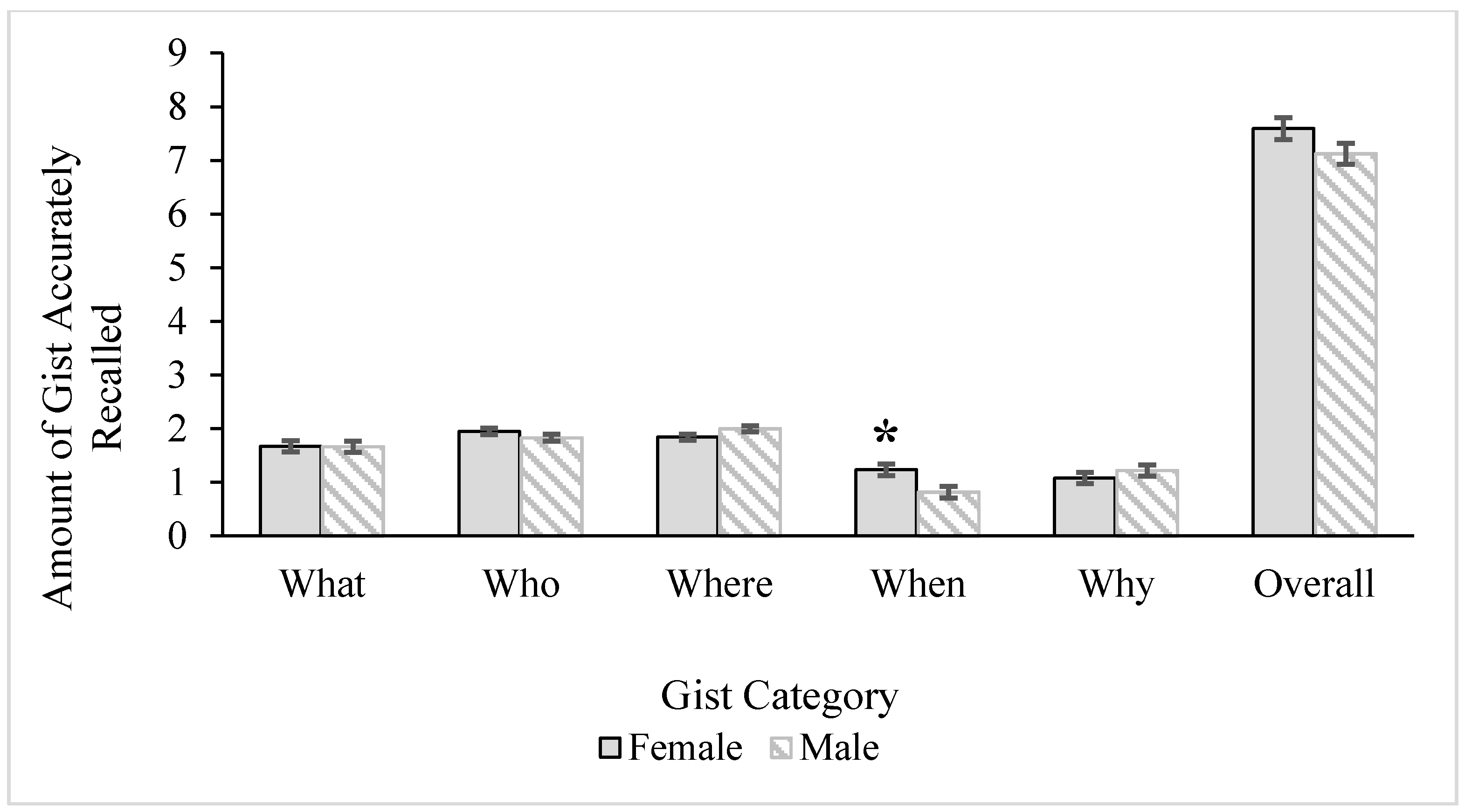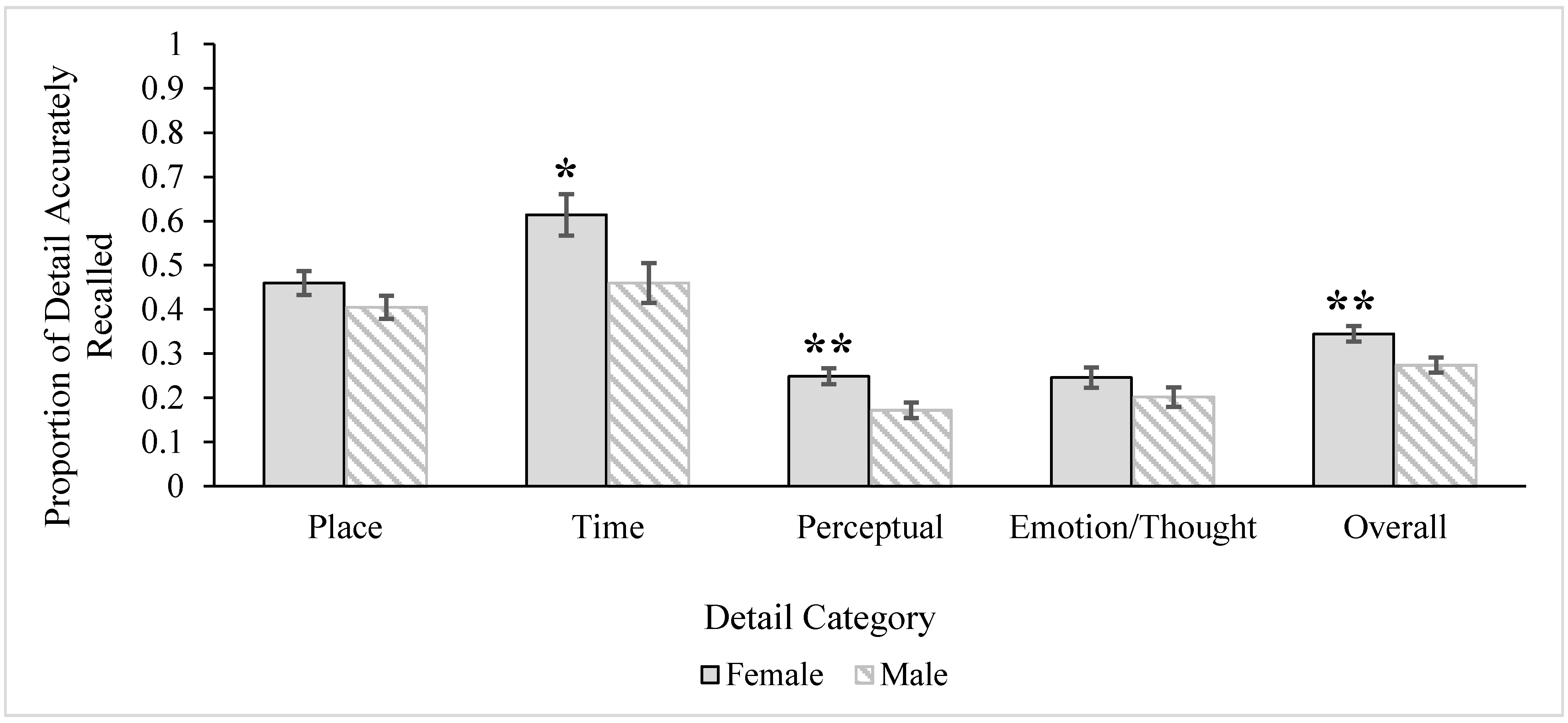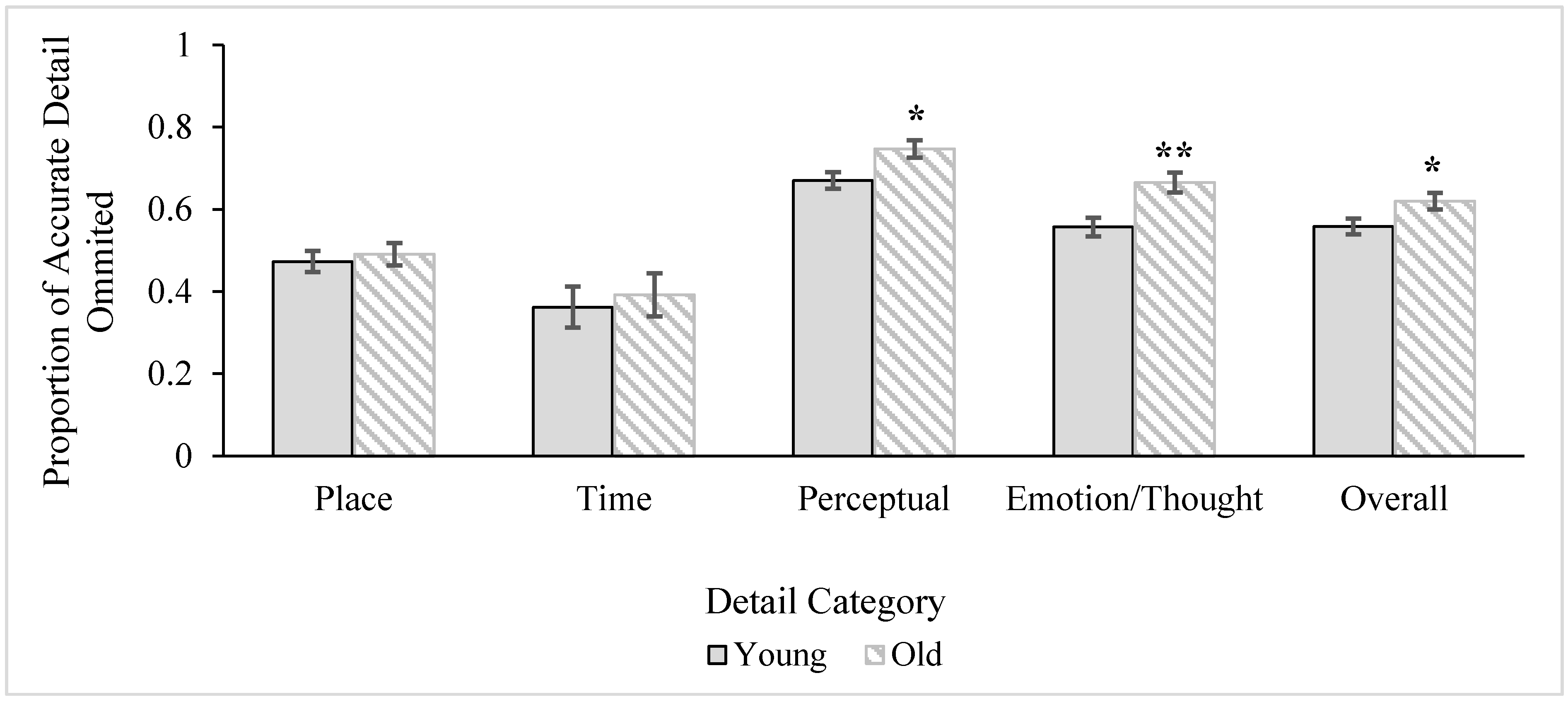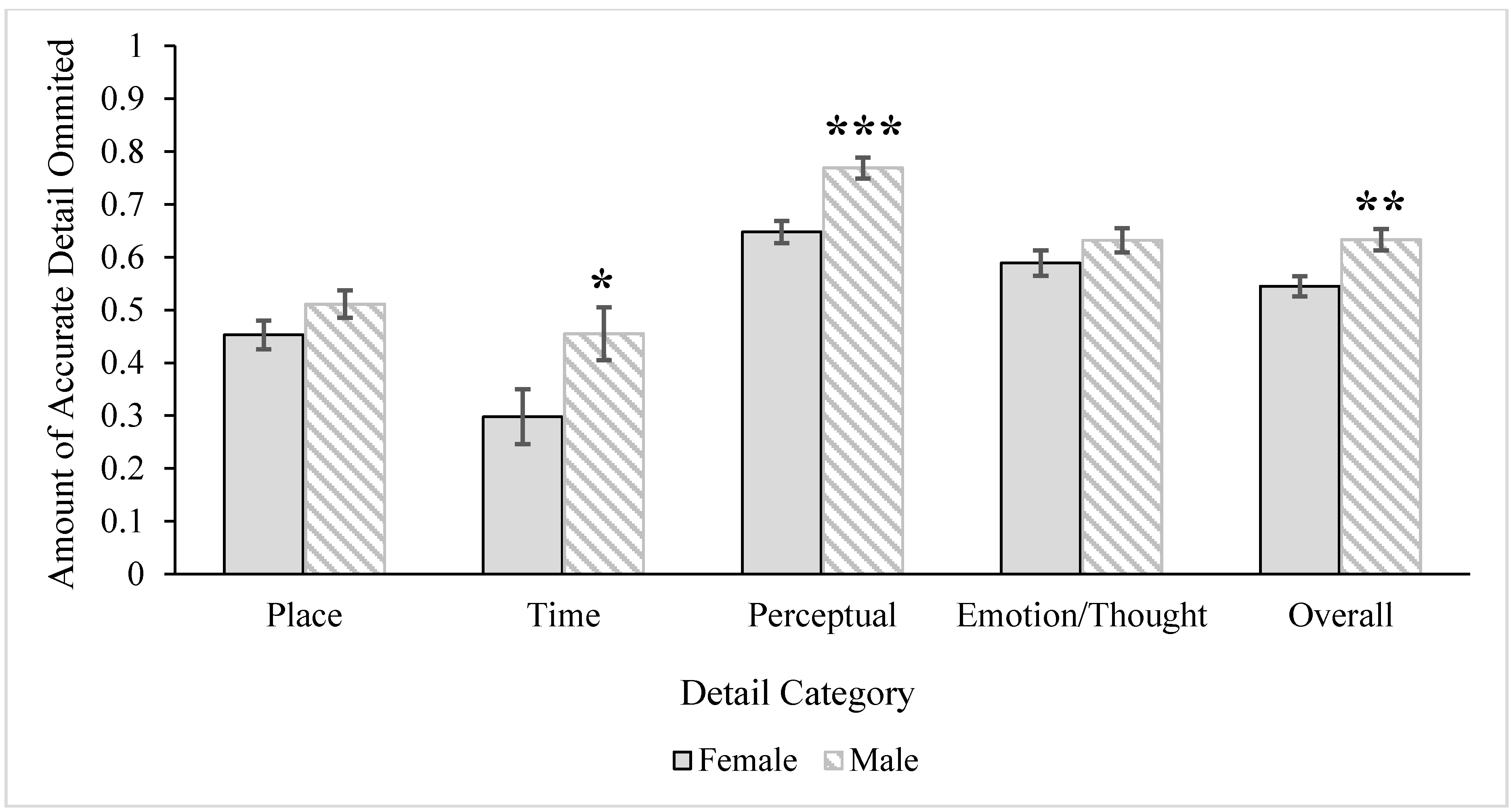The Difference between Right and Wrong: Accuracy of Older and Younger Adults’ Story Recall
Abstract
:1. Introduction
1.1. The Role of Accuracy in Story Recall
1.2. Age Differences in Story Recall
1.3. Gender Differences in Story Recall
1.4. The Present Study
2. Method Section
2.1. Participants
2.2. Measures and Procedure
2.3. Content-Coding for Accuracy
| Code | Accurate Original Story Information |
|---|---|
| Gist | |
| What | browsed around at the booths parked the car away from the event |
| Who | the couple |
| Where | in Washington, DC stopped in Kansas along the way |
| When | during the evening in Fall |
| Why | because she had wanted to go because it was a holiday |
| Details | |
| Place | area around the Mall near the ranger station |
| Time | it was the 4th of July in August |
| Perceptual | fireworks were spectacular drive was cool and comfortable |
| Emotion/Thought | impressed with the evening happy about their first trip |
2.3.1. Accuracy of Gist
2.3.2. Accuracy of Detail
3. Results and Discussion
3.1. Preliminary Analyses
| Measure | 1 | 2 | 3 | 4 | 5 | 6 | 7 | |
|---|---|---|---|---|---|---|---|---|
| 1 | Age Group | - | ||||||
| 2 | Gender | −0.02 | - | |||||
| 3 | Education in total years | −0.36 ** | 0.08 | - | ||||
| 4 | Episodic Memory | −0.32 * | 0.37 ** | 0.20 | - | |||
| 5 | Gist Accuracy Total | −0.11 | 0.21 | 0.19 | 0.14 | - | ||
| 6 | Detail Accuracy Total | −0.24 | 0.34 ** | 0.15 | 0.34 ** | 0.20 | - | |
| 7 | Detail Missing Total | 0.28 * | −0.38 ** | −0.23 | −0.34 ** | −0.22 | −0.93 ** | - |
3.2. Primary Analyses
3.2.1. Gist Accuracy
| Gist Accuracy | Age Group | |||||||
|---|---|---|---|---|---|---|---|---|
| Younger Adults | Older Adults | |||||||
| Women | Men | Women | Men | |||||
| M | SD | M | SD | M | SD | M | SD | |
| Overall | 7.69 | 1.19 | 7.25 | 1.29 | 7.50 | 0.94 | 7.00 | 0.97 |
| What | 1.64 | 0.63 | 1.90 | 0.30 | 1.70 | 0.48 | 1.42 | 0.51 |
| Who | 2.00 | 0.00 | 1.91 | 0.30 | 1.90 | 0.32 | 1.75 | 0.45 |
| Where | 1.79 | 0.43 | 2.00 | 0.00 | 1.90 | 0.32 | 2.00 | 0.00 |
| When | 1.07 | 0.47 | 0.64 | 0.50 | 1.40 | 0.52 | 1.00 | 0.60 |
| Why | 1.36 | 0.49 | 1.27 | 0.47 | 0.80 | 0.42 | 1.17 | 0.58 |


3.2.2. Details: Accuracy
| Detail Accuracy | Age Group | |||||||
|---|---|---|---|---|---|---|---|---|
| Younger Adults | Older Adults | |||||||
| Women | Men | Women | Men | |||||
| M | SD | M | SD | M | SD | M | SD | |
| Overall | 0.36 | 0.09 | 0.30 | 0.12 | 0.32 | 0.06 | 0.25 | 0.10 |
| Place | 0.45 | 0.13 | 0.42 | 0.19 | 0.47 | 0.09 | 0.39 | 0.15 |
| Time | 0.63 | 0.21 | 0.51 | 0.27 | 0.60 | 0.23 | 0.41 | 0.29 |
| Perceptual | 0.28 | 0.19 | 0.20 | 0.11 | 0.22 | 0.08 | 0.14 | 0.08 |
| Emotion/Thought | 0.29 | 0.14 | 0.23 | 0.14 | 0.19 | 0.07 | 0.18 | 0.12 |

3.2.3. Details: Errors of Omission
| Errors of Omission | Age Group | |||||||
|---|---|---|---|---|---|---|---|---|
| Younger Adults | Older Adults | |||||||
| Women | Men | Women | Men | |||||
| M | SD | M | SD | M | SD | M | SD | |
| Overall | 0.52 | 0.13 | 0.59 | 0.12 | 0.57 | 0.06 | 0.67 | 0.10 |
| Place | 0.46 | 0.17 | 0.48 | 0.17 | 0.44 | 0.09 | 0.54 | 0.15 |
| Time | 0.33 | 0.24 | 0.39 | 0.24 | 0.27 | 0.24 | 0.52 | 0.38 |
| Perceptual | 0.61 | 0.14 | 0.73 | 0.15 | 0.69 | 0.07 | 0.81 | 0.08 |
| Emotion | 0.52 | 0.14 | 0.59 | 0.15 | 0.66 | 0.08 | 0.66 | 0.13 |


3.3. Discussion
3.3.1. Age Effects
Age Differences in Gist Recall
Age Differences in Detail Recall
3.3.2. Gender Effects
3.3.3. Limitations
4. Conclusions
Author Contributions
Conflicts of Interest
References and Notes
- Dixon, R.A.; Gould, O.N. Adults telling and retelling stories collaboratively. In Interactive Minds: Lifespan Perspectives of the Social Foundation of Cognition; Baltes, P.B., Staudinger, U.M., Eds.; Cambridge University Press: New York, NY, US, 1996; pp. 221–241. [Google Scholar]
- Swearingen, C. The narration of dialogue and narration within dialogue: The transition from story to logic. In Narrative Thought and Narrative Language; Britton, B.K., Pellegrini, A.D., Eds.; Lawrence Erlbaum Associates, Incorporated: Hillsdale, NJ, USA, 1990; pp. 173–197. [Google Scholar]
- Arbuckle, T.Y.; Pushkar, D.; Bourgeois, S.; Bonneville, L. Off-target verbosity, everyday competence, and subjective well-being. Gerontology 2003, 50, 291–297. [Google Scholar] [CrossRef] [PubMed]
- Pasupathi, M.; Carstensen, L.L. Age and emotional experience during mutual reminiscing. Psychol. Aging 2003, 18, 430–442. [Google Scholar] [CrossRef] [PubMed]
- Alea, N.L.; Bluck, S.; Semegon, A.B. Young and older adults’ expression of emotional experience: Do autobiographical narratives tell a different story? J. Adult Dev. 2005, 11, 235–250. [Google Scholar] [CrossRef]
- Bluck, S.; Habermas, T. The life story schema. Motiv. Emot. 2001, 24, 121–147. [Google Scholar] [CrossRef]
- Levine, B.; Svoboda, E.; Hay, J.; Winocur, G.; Moscovitch, M. Aging and autobiographical memory: Dissociating episodic from semantic retrieval. Psychol. Aging 2002, 17, 677–689. [Google Scholar] [CrossRef] [PubMed]
- Trunk, D.L.; Abrams, L. Do younger and older adults’ communicative goals influence off-topic speech in autobiographical narratives? Psychol. Aging 2009, 24, 324–337. [Google Scholar] [CrossRef] [PubMed]
- Gould, O.; Kurzman, D.; Dixon, R.A. Communication during prose recall conversations by young and old dyads. Discourse Process. 1994, 17, 149–165. [Google Scholar] [CrossRef]
- Gould, O.N.; Trevithick, L.; Dixon, R.A. Adult age differences in elaborations produced during prose recall. Psychol. Aging 1991, 6, 93–99. [Google Scholar] [CrossRef] [PubMed]
- Baumeister, R.F.; Zhang, L.; Vohs, K.D. Gossip as cultural learning. Rev. Gen. Psychol. 2004, 8, 111–121. [Google Scholar] [CrossRef]
- Feinberg, M.; Willer, R.; Stellar, J.; Keltner, D. The virtues of gossip: Reputational information sharing as prosocial behavior. J. Pers. Soc. Psychol. 2012, 102, 1015–1030. [Google Scholar] [CrossRef] [PubMed]
- Frieske, D.A.; Park, D.C. Memory for news in young and old adults. Psychol. Aging 1999, 14, 90–98. [Google Scholar] [CrossRef] [PubMed]
- Adams, C.; Smith, M.C.; Nyquist, L.; Perlmutter, M. Adult age-group differences in recall for the literal and interpretive meanings of narrative text. J. Gerontol. Ser. B Psychol. Sci. Soc. Sci. 1997, 52B, 187–195. [Google Scholar] [CrossRef]
- Holland, C.A.; Rabbitt, P.M. Autobiographical and text recall in the elderly: An investigation of a processing resource deficit. Q. J. Exp. Psychol. 1990, 42, 441–470. [Google Scholar] [CrossRef]
- Mund, I.; Bell, R.; Buchner, A. Aging and interference in story recall. Exp. Aging Res. 2012, 38, 20–41. [Google Scholar] [CrossRef] [PubMed]
- Loftus, E.F. 25 years of eyewitness science……finally pays off. Perspect. Psychol. Sci. 2013, 8, 556–557. [Google Scholar] [CrossRef] [PubMed]
- West, R.L.; Stone, K.R. Age differences in eyewitness memory for a realistic event. J. Gerontol. Ser. B Psychol. Sci. Soc. Sci. 2014, 69B, 338–347. [Google Scholar] [CrossRef] [PubMed]
- Toglia, M.P.; Ross, D.F.; Pozzulo, J.; Pica, E. The Elderly Eyewitness in Court; Psychology Press: New York, NY, USA, 2014. [Google Scholar]
- Nelson, K.J.; Laney, C.; Fowler, N.B.; Knowles, E.D.; Davis, D.; Loftus, E.F. Change blindness can cause mistaken eyewitness identification. Leg. Criminol. Psychol. 2011, 16, 62–74. [Google Scholar] [CrossRef]
- Smalarz, L.; Wells, G.L. Confirming feedback following a mistaken identification impairs memory for the culprit. Law Hum. Behav. 2014, 38, 283–292. [Google Scholar] [CrossRef] [PubMed][Green Version]
- Deffenbacher, K.A.; Bornstein, B.H.; Penrod, S.D.; McGorty, E.K. A meta-analytic review of the effects of high stress on eyewitness memory. Law Hum. Behav. 2004, 28, 687–706. [Google Scholar] [CrossRef] [PubMed]
- Barber, S.J.; Mather, M. How retellings shape younger and older adults’ memories. J. Cogn. Psychol. 2014, 26, 263–279. [Google Scholar] [CrossRef] [PubMed]
- Feinberg, M.; Willer, R.; Schultz, M. Gossip and ostracism promote cooperation in groups. Psychol. Sci. 2014, 25, 656–664. [Google Scholar] [CrossRef] [PubMed]
- Giardini, F. Deterrence and transmission as mechanisms ensuring reliability of gossip. Cogn. Process. 2012, 13, S465–S475. [Google Scholar] [CrossRef] [PubMed][Green Version]
- Bluck, S. Autobiographical memory: Exploring its functions in everyday life. Memory 2003, 11, 113–123. [Google Scholar] [CrossRef] [PubMed]
- Kihlstrom, J.F. “So that we might have roses in December”: The functions of autobiographical memory. Appl. Cogn. Psychol. 2009, 23, 1179–1192. [Google Scholar] [CrossRef]
- Newman, E.J.; Lindsay, D.S. False memories: What the hell are they for? Appl. Cogn. Psychol. 2009, 23, 1105–1121. [Google Scholar] [CrossRef]
- Bluck, S.; Alea, N.; Demiray, B. You get what you need: The psychosocial functions of remembering. In The Act of Remembering: Toward an Understanding of How We Recall the Past; Mace, J.H., Ed.; Wiley-Blackwell: Oxford, UK, 2011; pp. 284–307. [Google Scholar]
- Baron, J.M.; Bluck, S. Autobiographical memory sharing in everyday life: Characteristics of a good story. Int. J. Behav. Dev. 2009, 33, 105–117. [Google Scholar] [CrossRef]
- D’Argembeau, A.; Comblain, C.; Van der Linden, M. Phenomenal characteristics of autobiographical memories for positive, negative, and neutral events. Appl. Cogn. Psychol. 2003, 17, 281–294. [Google Scholar] [CrossRef]
- Larsen, S.F. What is it like to remember? On phenomenal qualities of memory. In Autobiographical Memory: Theoretical and Applied Perspectives; Thompson, C.P., Herrmann, D.J., Bruce, D., Read, J., Payne, D.G., Toglia, M.P., Eds.; Erlbaum Associates Publishers: Mahwah, NJ, USA, 2014; pp. 163–190. [Google Scholar]
- Nadel, L.; Samsonovich, A.; Ryan, L.; Moscovitch, M. Multiple trace theory of human memory: Computational, neuroimaging, and neuropsychological results. Hippocampus 2000, 10, 352–368. [Google Scholar] [CrossRef]
- Schneider, P.; Winship, S. Adults’ judgments of fictional story quality. J. Speech Lang Hear. Res. 2002, 45, 372–383. [Google Scholar] [CrossRef]
- Adams, C.; Labouvie-Vief, G.; Hobart, C.J.; Dorosz, M. Adult age group differences in story recall style. J. Gerontol. Psychol. Sci. 1990, 45, 17–27. [Google Scholar] [CrossRef]
- McGinnis, D.; Goss, R.; Tessmer, C.; Zelinski, E.M. Inference generation in young, young-old and old-old adults: Evidence for semantic architecture stability. Appl. Cogn. Psychol. 2008, 22, 171–192. [Google Scholar] [CrossRef]
- Anderson, S.J.; Cohen, G.; Taylor, S. Rewriting the past: Some factors affecting the variability of personal memories. Appl. Cogn. Psychol. 2000, 14, 435–454. [Google Scholar] [CrossRef]
- Bornstein, B.H. Memory processes in elderly eyewitnesses: What we know and what we don’t know. Behav. Sci. Law 1995, 13, 349–363. [Google Scholar] [CrossRef]
- Hashtroudi, S.; Johnson, M.K.; Chrosniak, L.D. Aging and qualitative characteristics of memories for perceived and imagined complex events. Psychol. Aging 1990, 5, 119–126. [Google Scholar] [CrossRef] [PubMed]
- Juncos-Rabadán, O.; Pereiro, A.X.; Rodríguez, M. Narrative speech in aging: Quantity, information content, and cohesion. Brain Lang. 2005, 95, 423–434. [Google Scholar] [CrossRef] [PubMed]
- McClean, K.C. Stories of the young and the old: Personal continuity and narrative identity. Dev. Psychol. 2008, 44, 254–264. [Google Scholar] [CrossRef] [PubMed]
- Rice, C.; Pasupathi, M. Reflecting on self-relevant experiences: Adult age differences. Dev. Psychol. 2008, 46, 479–490. [Google Scholar] [CrossRef] [PubMed]
- Otani, H.; Libkuman, T.M.; Widner, R.R.; Graves, E.I. Memory for emotionally arousing stimuli: A comparison of younger and older Adults. J. Gen. Psychol. 2007, 134, 23–42. [Google Scholar] [CrossRef] [PubMed]
- Cohen, G.; Faulkner, D. Age differences in source forgetting: Effects on reality monitoring and on eyewitness testimony. Psychol. Aging 1989, 4, 10–17. [Google Scholar] [CrossRef] [PubMed]
- Karpel, M.E.; Hoyer, W.J.; Toglia, M.P. Accuracy and qualities of real and suggested memories: Nonspecific age differences. J. Gerontol. Ser. B Psychol. Sci. Soc. Sci. 2001, 56B, 103–110. [Google Scholar] [CrossRef]
- Mitchell, K.J.; Johnson, M.K.; Mather, M. Source monitoring and suggestibility to misinformation: Adult age-related differences. Appl. Cogn. Psychol. 2003, 17, 107–119. [Google Scholar] [CrossRef]
- Coxon, P.; Valentine, T. The effects of the age of eyewitnesses on the accuracy and suggestibility of their testimony. Appl. Cogn. Psychol. 1997, 11, 415–430. [Google Scholar] [CrossRef]
- Gabbert, F.; Memon, A.; Allan, K. Memory conformity: Can eyewitnesses influence each other’s memories for an event? Appl. Cogn. Psychol. 2003, 17, 533–543. [Google Scholar] [CrossRef]
- Memon, A.; Bartlett, J.; Rose, R.; Gray, C. The aging eyewitness: Effects of age on face, delay, and source-memory ability. J. Gerontol. Ser. B Psychol. Sci. Soc. Sci. 2003, 58B, 338–345. [Google Scholar] [CrossRef]
- Memon, A.; Hope, L.; Bartlett, J.; Bull, R. Eyewitness recognition errors: The effects of mugshot viewing and choosing in young and old adults. Mem. Cognit. 2002, 30, 1219–1227. [Google Scholar] [CrossRef] [PubMed][Green Version]
- Searcy, J.H.; Bartlett, J.C.; Memon, A. Age differences in accuracy and choosing in eyewitness identification and face recognition. Mem. Cognit. 1999, 27, 538–552. [Google Scholar] [CrossRef] [PubMed][Green Version]
- Bartlett, J. The older eyewitness. In The SAGE Handbook of Applied Memory; Perfect, T.J., Lindsay, D.S., Eds.; SAGE Publications: London, England, 2013; pp. 654–675. [Google Scholar]
- Price, J.; Mueller, M.L.; Wetmore, S.; Neuschatz, J. Eyewitness memory and metamemory in older adults. In The Elderly Eyewitness in Court; Toglia, M.P., Ross, D.F., Pozzulo, J., Pica, E., Toglia, M.P., Ross, D.F., Pica, E., Eds.; Psychology Press: New York, NY, USA, 2014; pp. 167–191. [Google Scholar]
- Venn, S.; Davidson, K.; Arber, S. Gender and Aging. In Handbook of Sociology and Aging; Settersten, R.A., Angel, J.L., Eds.; Springer: New York, NY, USA, 2011; pp. 71–81. [Google Scholar]
- Bussey, K.; Bandura, A. Social cognitive theory of gender development and differentiation. Psychol. Rev. 1999, 106, 676–713. [Google Scholar] [CrossRef] [PubMed]
- Eagly, A.H.; Steffen, V.J. Gender stereotypes stem from the distribution of women and men into social roles. In Stereotypes and Prejudice: Essential Readings; Stangor, C., Ed.; Psychology Press: New York, NY, USA, 2000; pp. 142–160. [Google Scholar]
- González-Torres, M.A.; Fernandez-Rivas, A. Self-identity and gender differences. In Psychopathology in Women: Incorporating Gender Perspective into Descriptive Psychopathology; Sáenz-Herrero, M., Ed.; Springer: Cham, Switzerland, 2015; pp. 67–82. [Google Scholar]
- Zelinski, E.M.; Gilewski, M.J.; Schaie, K.W. Individual differences in cross-sectional and 3-year longitudinal memory performance across the adult life span. Psychol. Aging 1993, 8, 176–186. [Google Scholar] [CrossRef] [PubMed]
- Ross, M.; Holmberg, D. Are wives’ memories for events in relationships more vivid than their husbands’ memories? J. Soc. Pers. Relat. 1992, 9, 585–604. [Google Scholar] [CrossRef]
- Areh, I. Gender-related differences in eyewitness testimony. Pers. Individ. Dif. 2011, 50, 559–563. [Google Scholar] [CrossRef]
- Horgan, T.G.; Schmid Mast, M.; Hall, J.A.; Carter, J.D. Gender differences in memory for the appearance of others. Pers. Soc. Psychol. Bull. 2004, 30, 185–196. [Google Scholar] [CrossRef] [PubMed]
- Lindholm, T.; Christianson, S. Gender effects in eyewitness accounts of a violent crime. Psychol. Crime Law 1998, 4, 323–339. [Google Scholar] [CrossRef]
- Loftus, E.F. Eyewitness Testimony; Harvard University Press: Cambridge, MA, US, 1996. [Google Scholar]
- Yarmey, A.D. Adult age and gender differences in eyewitness recall in field settings. J. Appl. Soc. Psychol. 1993, 23, 1921–1932. [Google Scholar] [CrossRef]
- Rehnman, J.; Herlitz, A. Women remember more faces than men do. Acta Psychol. 2007, 124, 344–355. [Google Scholar] [CrossRef] [PubMed]
- Herlitz, A.; Rehnman, J. Sex differences in episodic memory. Curr. Dir. Psychol. Sci. 2008, 17, 52–56. [Google Scholar] [CrossRef]
- Lewin, C.; Wolgers, G.; Herlitz, A. Sex differences favoring women in verbal but not in visuospatial episodic memory. Neuropsychology 2001, 15, 165–173. [Google Scholar] [CrossRef] [PubMed]
- Loftus, E.F.; Banaji, M.R.; Schooler, J.W.; Foster, R.A. Who remembers what? Gender differences in memory. Mich. Q. Rev. 1987, 26, 64–85. [Google Scholar]
- Singh, B.; Mishra, S. Effect of gender and type of encoding on retention of traits. J. Indian Acad. Appl. Psychol. 2006, 32, 26–29. [Google Scholar]
- Van Hooren, S.A.H.; Valentijn, A.M.; Bosma, H.; Ponds, R.W.H.M.; van Boxtel, M.P.J.; Jolles, J. Cognitive functioning in healthy older adults aged 64–81: A cohort study into the effects of age, sex, and education. Aging Neuropsychol. Cogn. 2007, 14, 40–54. [Google Scholar] [CrossRef] [PubMed]
- U.S. Census Bureau: State and County QuickFacts. Available online: http://quickfacts.census.gov/qfd/states/12000.html (accessed on 25 August 2015).
- Roccafort, W.H.; Burke, W.J.; Bayer, B.L.; Wengel, S.P. Validation of a telephone version of the Mini-Mental State Examination. J. Am. Geriatr. Soc. 1992, 40, 697–702. [Google Scholar] [CrossRef]
- Maddox, G.L. Some correlates of differences in self-assessment of health status among the elderly. J. Gerontol. 1962, 17, 180–185. [Google Scholar] [CrossRef] [PubMed]
- Dixon, R.A.; Wahlin, Å.; Maitland, S.B.; Hultsch, D.F.; Hertzog, C.; Bäckman, L. Episodic memory change in late adulthood: Generalizability across samples and performance indices. Mem. Cognit. 2004, 32, 768–778. [Google Scholar] [CrossRef] [PubMed]
- Rey, A. L’examen Ciinique en Psychologie; Presses Universitaires de France: Paris, France, 1964. [Google Scholar]
- Dixon, R.A.; Hultsch, D.R.; Hertzog, C. A Manual of Twenty-Five Three-Tiered Structurally Equivalent Texts for Use in Aging Research; University of Victoria, Collaborative Research Group on Cognitive Aging: Victoria, BC, Canada, 1989. [Google Scholar]
- Shaffer, D.R.; Pegalis, L.J.; Bazzini, D.G. When boy meets girl: Gender, gender-role orientation, and prospect of future interaction as determinants of self-disclosure among same and opposite sex acquaintances. Pers. Soc. Psychol. Bull. 1996, 22, 495–506. [Google Scholar] [CrossRef]
- Krippendorff, K. Content Analysis: An Introduction to Its Methodology; Sage Publications, Incorporated: Thousand Oaks, CA, USA, 2004. [Google Scholar]
- Note that analyses were also conducted, for completion, with the variables entered in separately as covariates. However, the results remain virtually identical to what is reported here. Only one result changed: an age effect emerged for perceptual details, F (1, 57) = 5.44, MS = 0.05, p = 0.02, ηρ² = 0.08. Younger adults remembered perceptual details more accurately than older adults when education was included alone as a covariate (but not when education and episodic memory were included together). Given that the remainder of the results remain unchanged, however, and that including covariates separately in analyses would drastically increase the Type I error, analyses reported include covariates entered in the model together.
- Johnson, D.K.; Storandt, M.; Balota, D.A. Discourse analysis of logical memory recall in normal aging and in dementia of the Alzheimer type. Neuropsychology 2003, 17, 82–92. [Google Scholar] [CrossRef] [PubMed]
- Koutstaal, W. Older adults encode—but do not always use—perceptual details: Intentional versus unintentional effects of detail on memory judgments. Psychol. Sci. 2003, 14, 189–193. [Google Scholar] [CrossRef] [PubMed]
- Koutstaal, W.; Schacter, D.L.; Galluccio, L.; Stofer, K.A. Reducing gist-based false recognition in older adults: Encoding and retrieval manipulations. Psychol. Aging 1999, 14, 220–237. [Google Scholar] [CrossRef] [PubMed]
- Reese, E.; Haden, C.A.; Baker-Ward, L.; Bauer, P.A.; Fivush, R.; Ornstein, P. Coherence of personal narratives across the lifespan: A multidimensional model and coding method. J. Cogn. Dev. 2011, 12, 424–462. [Google Scholar] [CrossRef] [PubMed]
- Pasupathi, M.; Rich, B. Inattentive listening undermines self-verification in personal storytelling. J. Pers. 2005, 73, 1051–1086. [Google Scholar] [CrossRef] [PubMed]
- Wagenaar, W.A. My memory: A study of autobiographical memory over six years. Cogn. Psychol. 1986, 18, 225–252. [Google Scholar] [CrossRef]
- Crawley, S.E.; Pring, L. When did Mrs. Thatcher resign? The effects of ageing on the dating of public events. Memory 2000, 8, 111–121. [Google Scholar] [CrossRef] [PubMed]
- James, L.E.; Burke, D.M.; Austin, A.; Hulme, E. Production and perception of “verbosity” in younger and older adults. Psychol. Aging 1998, 13, 355–367. [Google Scholar] [CrossRef] [PubMed]
- Pratt, M.W.; Robins, S.L. That’s the way it was: Age differences in the structure and quality of adults’ personal narratives. Discourse Process. 1991, 14, 73–85. [Google Scholar] [CrossRef]
- Ryan, E.B.; Kwong See, S.; Meneer, W.; Trovato, D. Age-based perceptions of language performance among younger and older adults. Commun. Res. 1992, 19, 423–443. [Google Scholar] [CrossRef]
- Comblain, C.; D’Argembeau, A.; van der Linden, M. Phenomenal characteristics of autobiographical memories for emotional and neutral events in older and younger Adults. Exp. Aging Res. 2005, 31, 173–189. [Google Scholar] [CrossRef] [PubMed]
- Mather, M.; Knight, M. Goal-directed memory: The role of cognitive control in older adults’ emotional memory. Psychol. Aging 2005, 20, 554–570. [Google Scholar] [CrossRef] [PubMed]
- Carstensen, L.L. Evidence for a life-span theory of socioemotional selectivity. Curr. Dir. Psychol. Sci. 1995, 4, 151–156. [Google Scholar] [CrossRef]
- Khanjani, Z.; Jeddi, E.M.; Hekmati, I.; Khalilzade, S.; Etemadi Nia, M.; Andalib, M.; Ashrafian, P. Comparison of cognitive empathy, emotional empathy, and social functioning in different age groups. Aust. Psychol. 2015, 50, 80–85. [Google Scholar] [CrossRef]
- Wang, Q. Gender and emotion in everyday event memory. Memory 2013, 21, 503–511. [Google Scholar] [CrossRef] [PubMed]
- Alea, N.; Wang, Q. Going global: The functions of autobiographical memory in cultural context. Memory 2015, 23, 1–10. [Google Scholar] [CrossRef] [PubMed]
- Wang, Q.; Koh, J.K.; Song, Q. Meaning making through personal storytelling: Narrative research in the Asian American context. Asian Am. J. Psychol. 2015, 6, 88–96. [Google Scholar] [CrossRef]
- Pasupathi, M.; Henry, R.M.; Carstensen, L.L. Age and ethnicity differences in storytelling to young children: Emotionality, relationality and socialization. Psychol. Aging 2002, 17, 610–621. [Google Scholar] [CrossRef] [PubMed]
- Aspinawall, L.; Staudinger, U.M. A psychology of human strengths: Some central issues of an emerging field. In A psychology of Human Strengths: Fundamental Questions and Future Directions for a Positive Psychology; Aspinawall, L., Staudinger, U.M., Eds.; American Psychological Association: Washington, DC, USA, 2003; pp. 9–22. [Google Scholar]
- Brewster, K.L.; Padavic, L. Change in gender-ideology, 1977–1996: The contributions of intracohort change and population turnover. J. Marriage Fam. 2000, 62, 477–487. [Google Scholar] [CrossRef]
- Sindi, S.; Fiocco, A.J.; Juster, R.P.; Pruessner, J.; Lupien, S.J. When we test, do we stress? Impact of the testing environment on cortisol secretion and memory performance in older adults. Psychoneuroendocrinology 2013, 38, 1388–1396. [Google Scholar] [CrossRef] [PubMed]
- Adams, C.; Smith, M.C.; Pasupathi, M.; Vitolo, L. Social context effects on story recall in older and younger women: Does the listener make a difference? J. Gerontol. Ser. B Psychol. Sci. Soc. Sci. 2002, 57B, 28–40. [Google Scholar] [CrossRef]
- Baltes, P.B. On the incomplete architecture of human ontogeny: Selection, optimization, and compensation as foundation of developmental theory. Am. Psychol. 1997, 52, 366–380. [Google Scholar] [CrossRef] [PubMed]
- Baltes, P.B.; Lindenberger, U.; Staudinger, U.M. Life span theory in developmental psychology. In Handbook of Child Psychology: Volume. 1: Theoretical Models of Human Development, 6th ed.; Damon, W., Lerner, R.M., Eds.; Wiley: New York, NY, USA, 2006; pp. 569–664. [Google Scholar]
© 2015 by the authors; licensee MDPI, Basel, Switzerland. This article is an open access article distributed under the terms and conditions of the Creative Commons Attribution license (http://creativecommons.org/licenses/by/4.0/).
Share and Cite
Davis, D.K.; Alea, N.; Bluck, S. The Difference between Right and Wrong: Accuracy of Older and Younger Adults’ Story Recall. Int. J. Environ. Res. Public Health 2015, 12, 10861-10885. https://doi.org/10.3390/ijerph120910861
Davis DK, Alea N, Bluck S. The Difference between Right and Wrong: Accuracy of Older and Younger Adults’ Story Recall. International Journal of Environmental Research and Public Health. 2015; 12(9):10861-10885. https://doi.org/10.3390/ijerph120910861
Chicago/Turabian StyleDavis, Danielle K., Nicole Alea, and Susan Bluck. 2015. "The Difference between Right and Wrong: Accuracy of Older and Younger Adults’ Story Recall" International Journal of Environmental Research and Public Health 12, no. 9: 10861-10885. https://doi.org/10.3390/ijerph120910861
APA StyleDavis, D. K., Alea, N., & Bluck, S. (2015). The Difference between Right and Wrong: Accuracy of Older and Younger Adults’ Story Recall. International Journal of Environmental Research and Public Health, 12(9), 10861-10885. https://doi.org/10.3390/ijerph120910861





